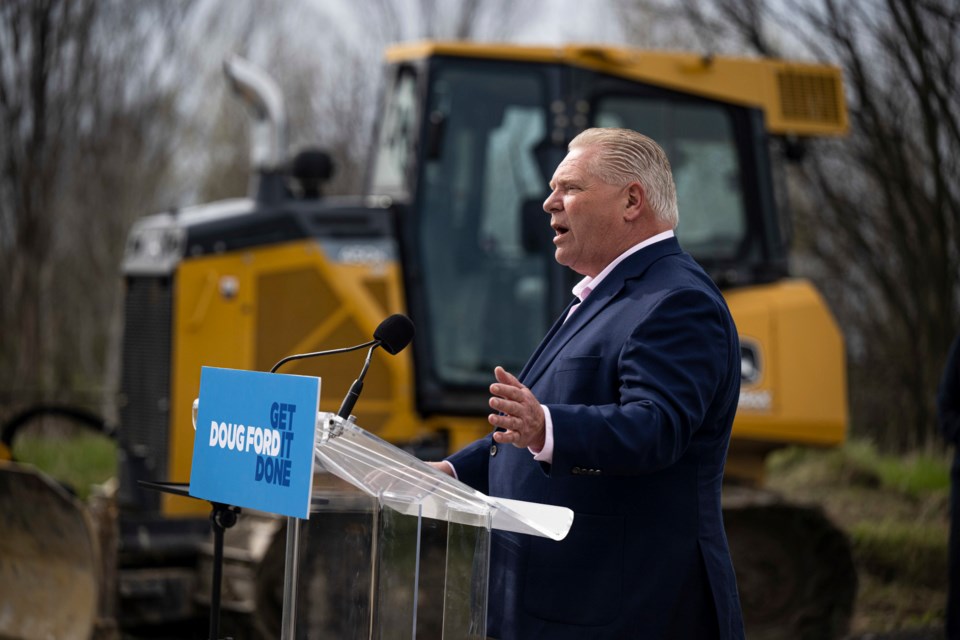EDITOR’S NOTE: This article originally appeared on The Trillium, a Village Media website devoted exclusively to covering provincial politics at Queen’s Park.
The Ford government is proposing to give itself sweeping powers to exempt any project from provincial and municipal laws, if passed, including the Ring of Fire.
The “Protecting Ontario by Unleashing our Economy Act,” tabled Thursday, would give the province the power to designate “special economic zones,” as well as “trusted proponents” and projects that fit criteria to be developed by cabinet.
Cabinet would then be allowed to exempt these proponents and projects from requirements under any provincial law or regulation, including bylaws of municipalities and local boards, that would otherwise apply in that zone.
The legislation also contains extensive provisions to block court actions that would arise from this power.
Ford said the move is necessary to protect Ontario from the economic impact of U.S. President Donald Trump’s tariffs, but it also addresses his long-held complaint that Ontario’s rules and regulations prevent moving projects forward quickly — particularly mining in the Ring of Fire.
“We can be a global critical mineral superpower, creating thousands of new jobs and billions of dollars worth of economic growth,” Ford said at a press conference announcing the bill. “But for far too long, Ontario has been held back when it comes to unlocking this enormous potential, not by foreign competition, not by a lack of talent or resources. We're being held back by our own processes. We're being held back by red tape and endless delays.”
The legislation wouldn't only affect mining. The government would consider designating any project that presents a major economic opportunity under the new legislation, such as the proposed tunnel under Highway 401 and other important infrastructure projects, Ford said.
The Ring of Fire
The Ring of Fire would be designated a special economic zone.
The bill, if passed, would also negate the current agreement for the proponent of the Eagle’s Nest mine in the Ring of Fire, Wyloo, to conduct an environmental assessment (EA).
It’s unclear, given the sweeping power of the proposed legislation, whether the mining project would be subject to any kind of environmental assessment. However, the three EAs being led by Indigenous communities concerning the road link to the Ring of Fire are not affected by the legislation, officials said.
Mines Minister Stephen Lecce said only that the EA requirement for the mine has changed because the project's scope has evolved since it signed a voluntary agreement to conduct a comprehensive environmental assessment, which occurred over a decade ago.
The dump
Another project singled out in the legislation is the expansion of the York1 landfill near Dresden, Ont. The project is controversial locally and has been publicly opposed by Steve Pinsonneault, the Progressive Conservative MPP in the riding.
But the bill would remove the requirement for the project to go through an environmental assessment that was ordered by the government just last year.
Ford said that was because 40 per cent of Ontario's waste goes to the U.S. and he's worried Trump could start turning dump trucks back at the border.
“Just imagine if tomorrow President Trump — and don't put it past him — President Trump says we aren't taking any more of Ontario's waste," said Ford. "What do we do? There's 40 per cent of it."
York1 is a Mississauga-based company involved in the disposal and recycling of construction waste, as well as other environmental services. It's financially backed by Fengate Asset Management and the LiUNA Pension Fund of Central and Eastern Canada.
Repealing the Endangered Species Act
The legislation would also repeal Ontario’s Endangered Species Act to overhaul how projects that affect species at risk can proceed, taking a “registration-first” approach that will allow them to move more quickly, according to civil servants who briefed the media.
It’s a “gutting” of protection for endangered species, according to Phil Pothen of Environmental Defence.
He described the proposed regime as the “thinnest, most flimsy fig leaf” of protection for endangered species.
The legislation would give cabinet the final say over Ontario’s list of protected species, rather than the expert Committee on the Status of Species at Risk in Ontario, make the definition of the habitat that must be protected extremely narrow, and neuter the enforcement of what protections remain, according to Pothen.
The bill also allows for exemptions from archeology requirements, on top of the new powers given under the “special economic zones” legislation.
Foreign participation in critical infrastructure
The bill would also allow the Ministry of Energy and Mines to limit the participation of foreign actors in energy supply, the mining industry, and critical infrastructure projects, with government officials singling out China as a target.




